"OCIMF works collegiately with all our fellow maritime NGOs and supports regulators whenever and wherever we can to gain the best results for mariners globally."
Director's Log

The OCIMF Executive Committee met last week in Houston where they reviewed the organisation’s performance and provided me with strategic direction.
In addition to my Director’ Report, subjects discussed included the prioritisation of work activities, and the OCIMF strategic focuses on barges and Greenhouse Gases/CO2.
I have often mentioned the importance and benefits of working together and quoted the great Aristotle, “The whole is greater than the sum of the parts”. An alternative and arguably more modern version of that was heard at the INTERTANKO Tanker Forum which I attended last week: “None of us are as smart as all of us”. OCIMF works collegiately with all our fellow maritime NGOs and supports regulators whenever and wherever we can to gain the best results for mariners globally. Amongst many areas of recent cooperation is our joint safety initiative with INTERTANKO; on the assessment and verification of non-technical competencies; the collation of best practices to communicate lessons learned; and the development of a tanker industry accident database to enable analysis that will assist in safe operations at sea and better regulation. The Executive Committees of OCIMF and INTERTANKO met last week to review progress and guide the working groups toward successful completion by the end of 2017.
Finally, I am proud to announce that the Quality Management System (QMS) of the SIRE programme was awarded the latest ISO 9001:2015 certification on 8 May by the British Standards Institution (BSI): one year early. The SIRE programme has maintained the ISO 9001 certification since July 2000. The recertification to ISO 9001:2015, with an increased scope to include training and accreditation and the Tanker Management and Self Assessment (TMSA), strengthens OCIMF’s commitment to providing quality services to SIRE programme participants.
Stay safe,

Andrew Cassels
Director OCIMF
Do you have news that you'd like to share with our readers? If so email
OCIMF welcomes new members
- Dolphin Energy Ltd
- Medco E&P Natuna Ltd
- Pampa Energia SA
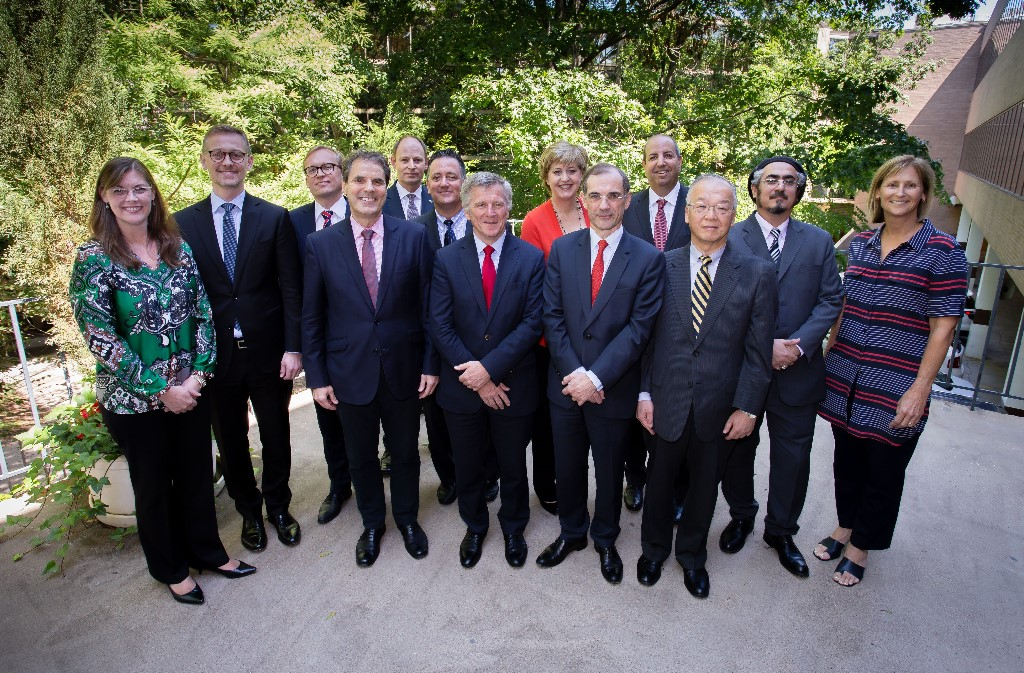
The Executive Committee. From left to right: Tracey Gunnlaugsson (ExxonMobil); Christian Ingerslev (Maersk); Kjetil Johnsen (Statoil); Grahaeme Henderson (Shell); Phil Pascoe (OCIMF); John DeRose (Phillips66); Andrew Cassels (OCIMF); Susan Dio (BP); Luc Gillet (Total); Mark Ross (Chevron);Keizo Atsumi (PIMA); Waddah Ghanem (ENOC); Karen Davis (ConocoPhillips). Photo by Egidio Narvaez.
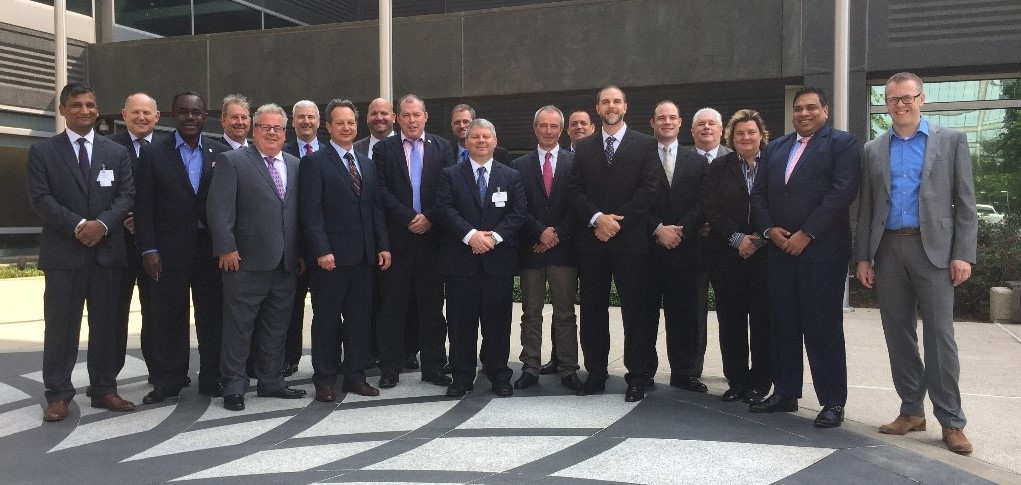
The Ports and Terminals Committee (PTC). From left to right: Cherian Oomen (SIGTTO); Kevan McGregor (Shell); Bill Asante (ExxonMobil); Tony Pollock (INEOS); Kurt Hallier (ConocoPhilips); Rob Drysdale (OCIMF); Mike Sitts (Chevron); Derek Thompson (P66); Andy Glass (BP); Will Doolittle (BP); Angelo Merolla (Chevron); Patrick Vantenat (Total); John Francis (Valero); Luciano Maldanado (Petrobras); Eric Vincent (Hess); Steve Carr (NuStar); Deb Cobb (Tesoro); Anuj Gupta (IMT); Arjan Maijenburg (Shell).
Ports and Terminals Committee
The Ports and Terminals Committee (PTC) held their 86th meeting on 26–27 April in Houston, USA.
The meeting was hosted by BP and followed a one day meeting of the Mooring Equipment Guidelines (MEG) Steering Group at the same location. The revisions to MEG was a key topic during the week, along with other work activities progressing under the PTC. The PTC also considered current and future work commitments and drew up a list in order of priority. This will help the PTC to manage workloads over the next six months.
The next PTC meeting is scheduled for 18–19 October and will be held at the OCIMF offices in London, UK.
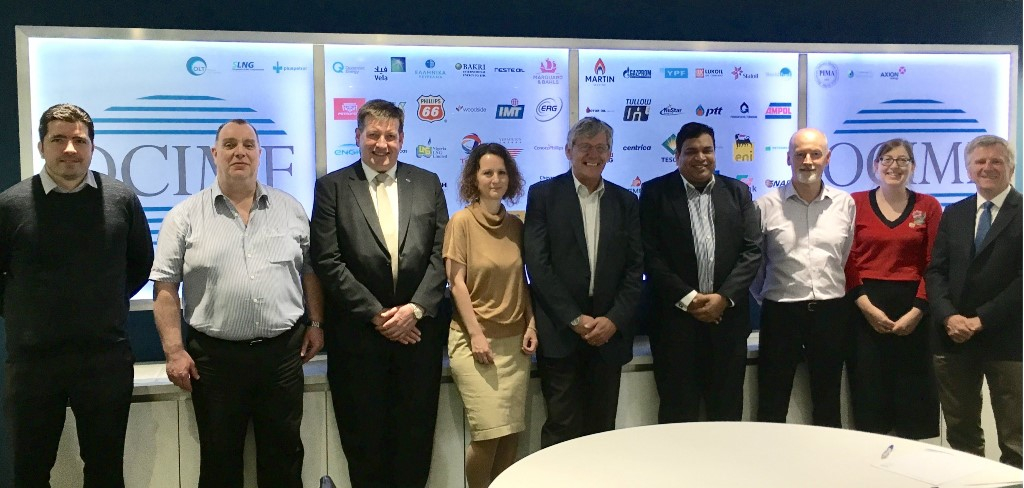
The TMSA3 team. From left to right: Juan Presedo (YPF); Andy Aithison (Shell); Tony Wynne (OCIMF); Krystyna Tsochlas (Phillips 66); Ian Shields (Nautascript); Anuj Gupta (IMT); Steve Barker (Chevron); Kelly Hadley and Andrew Cassels (OCIMF). Not pictured: Siddharth Misra (BP); Sachchidanand Sharma (Statoil); Sebastiano Bramanti (OMV); Marcio Aragao (Petrobras); Debra Cobb (Tesoro).
Thank you TMSA3 team
Members of the TMSA3 working group gathered at the OCIMF offices following the successful publication of the latest revision of TMSA.
Andrew Cassels thanked the members for their hard work and commitment during the last 18 months in producing the new edition, which has been well received by both members and tanker operators.
SIRE data mining tool
SIRE have created a data mining tool for technical vessel operators, that will allow them to monitor key metrics across their fleet.
Technical vessel operators with SIRE accounts will be able to see:
-
Average number of SIRE inspections per vessel.
-
Average number of observations per inspection.
-
Percentage of fleet holding at least three inspections within a user defined date range.
This tool will also allow technical vessel operators to compare inspections on their fleet with the global fleet based on the following criteria:
-
Most common observations.
-
Vessel operation at time of inspection.
-
Number of observations per VIQ chapter.
-
Recurring observations.
Ship owner associations will also be able to use the tool, but first need to request access and receive approval from OCIMF. INTERTANKO has been approved to use the tool.
The tool is now available for access through existing SIRE accounts.
Further details can be found in Section 11 (Operator Data Mining) of the SIRE Vessel Operator Quick Start Guide v3.8, which can be found within the Resources area of SIRE accounts.
Please contact the SIRE Team at
Integrating with OCIMF Web Services
Technical vessel operators registered with SIRE or OVID can now apply to integrate with OCIMF Web Services.
Integrating with OCIMF Web Services allows technical vessel operators to:
-
Automatically populate their vessels particulars (VPQs/OVPs), crew matrices and TMSA/OVMSA reports into their SIRE or OVID programmes directly from their vetting applications.
-
Automatically import their vessel inspection reports (VIQs/OVIQs) from the SIRE or OVID programmes into their vetting applications.
Vessel operators can use the data received from OCIMF Web Services API for their own internal analysis, but must not share the data with third parties or submit it to external systems.
To apply for OCIMF Web Services access, or for any enquiries, please contact:
Integrating the OCIMF Web Services within your applications will require some development work from your IT department. Please check with them before submitting an application.
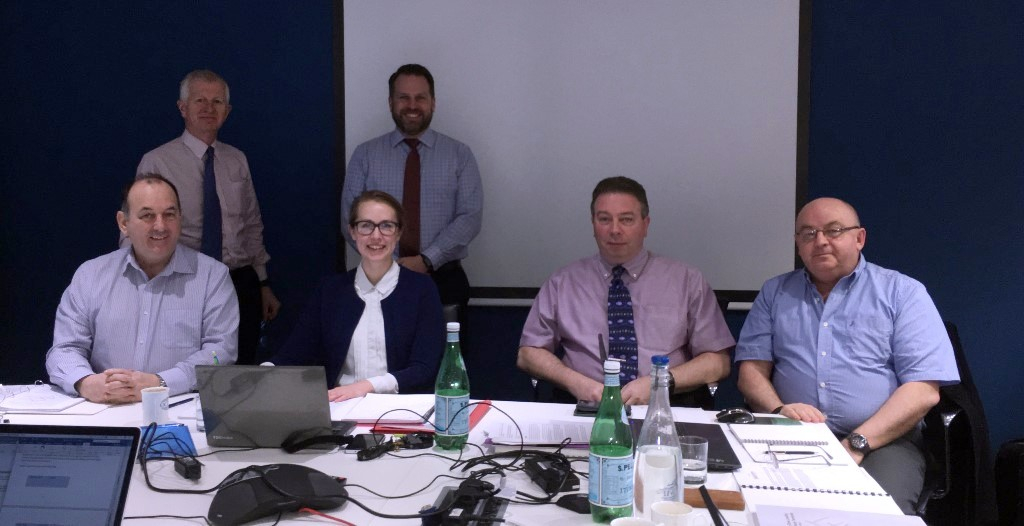
The Guidelines for Offshore Tanker Operations group. Back row, left to right: Andy Dogherty (representing MEG WG); Alex Van Dusen (OCIMF). Front row, l-r: John Reid (Shell); Emily Yates (OCIMF); Iain Chadwick (Technical Writer); Charles Humphreys (Chevron). Not pictured: Faisal Rashid (BP).
Guidelines for Offshore Tanker Operations
The group overseeing the development of the Guidelines for Offshore Tanker Operations (GOTO) held their third meeting from 15–16 May at the OCIMF office.
The group reviewed member feedback on the second draft of these guidelines, which brings together and supersedes the following OCIMF publications:
-
Offshore Safety Guidelines with Special Relevance to Harsh Weather Zones.
-
Tandem Mooring and Offloading Guidelines for Conventional Tankers at F(P)SO Facilities.
-
Recommendations for Equipment Employed in the Bow Mooring of Conventional Tankers at Single Point Moorings.
Work is progressing well, although some further review is required to make sure the publication aligns with other OCIMF guidance, particularly in the forthcoming Mooring Equipment Guidelines 4.
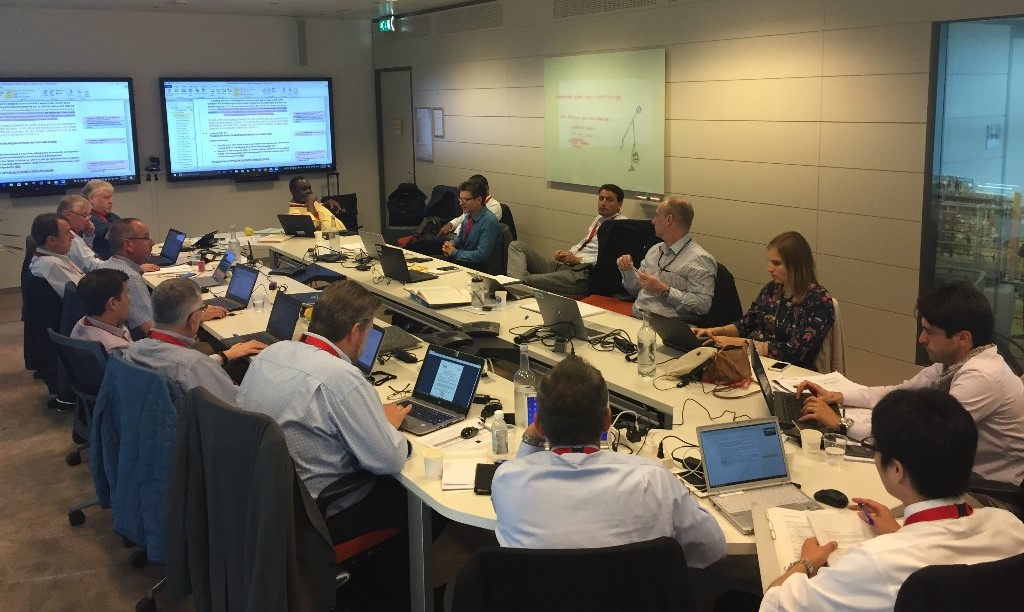
Marine Loading Arms
The working group overseeing the update to the Design and Construction Specification for Marine Loading Arms met on 23–24 May at the Shell office, Rijswijk, Netherlands.
The group are working on the fourth edition, which will update the third edition produced in 1999. The fourth edition will provide information for loading arms handling various cargos including oil, chemical, high pressure gas and vapour.
The working group are paying particular attention to updating the tables, which serve as a main point of communication between vendors and purchasers. The working group are working with vendors and MLA owners to make sure proper information is captured and presented clearly, to avoid any confusion or miscommunication.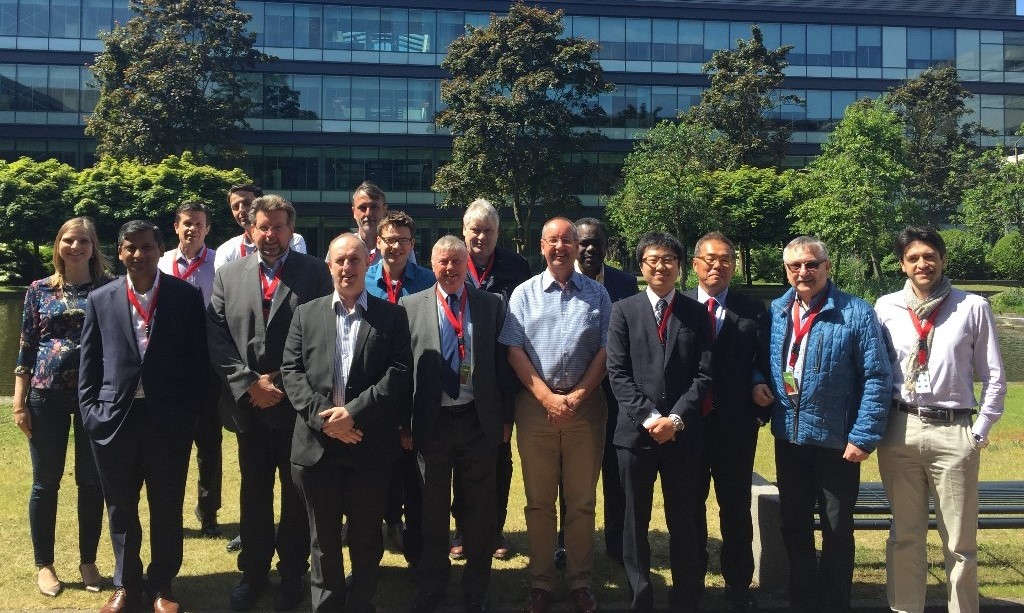
The Design and Construction Specification for Marine Loading Arms Working Group.
News from the IMO
The International Oil Pollution Compensation Funds (IOPC Funds) meeting was held at the IMO headquarters in London, UK from 24–28 April.
The IOPC Funds meeting included:
-
21st session of the 1992 Fund Assembly.
-
68th session of the 1992 Fund Executive Committee.
-
5th extraordinary session of the Supplementary Fund.
The agenda was dominated by updates on the progress of existing claims, budget, strategic reports and planning. No significant incident has been declared since the last session and there has not yet been a claim against the Supplementary Fund.
Budget
The 1992 Fund Administrative Council decided to reduce the working capital from £22 million to £15 million over the budget years 2018 to 2020 by reducing the levy of contributions to the General Fund.
The Supplementary Fund Assembly decided to reimburse £830,000 on 1 March 2018 to contributors in 19 Member States who contributed to the original levy to the Supplementary Fund. The Supplementary Fund Assembly further decided to levy £1.5 million to the General Fund payable by 1 March 2018 by contributors in the current 31 Member States.
Use of the 1992 Conventions
The International Chamber of Shipping (ICS) and the International Group of Protection & Indemnity Clubs (IGP&I) presented a joint paper that highlighted the issue of states creating national laws for liability and compensation for damage to the environment that could be applied to incidents already covered by the 1992 Conventions. The Director of the IOPC Funds will draft a paper addressing these issues, and potential options to resolve, for the next IOPC Funds meeting in October 2017.
HNS Convention
Norway became the first state to ratify the HNS Protocol of the HNS Convention (International Convention on Liability and Compensation for Damage in Connection with the Carriage of Hazardous and Noxious Substances by Sea) in April 2017. More states hope to ratify in 2017/2018.

Dilek Ayhan, State Secretary in the Norwegian Ministry of Trade, Industry and Fisheries, handing over the instrument of ratification of the 2010 HNS Protocol to IMO Secretary-General Kitack Lim. © IMO.
The 104th session of the Legal Committee was held at the IMO headquarters in London, UK from 26–28 April.
The agenda was very light, with only 28 papers to be discussed. The main points of interest were mainly dedicated to the fair treatment of seafarers, HNS Convention implementation, advice to committees and piracy.
Fair treatment of seafarers
The International Transport Workers Federation (ITF) will hold a workshop at the IMO in June to help member states understand the guidelines.
HNS Convention
The Committee noted with appreciation Norway’s ratification of the HNS Protocol.
The EU Council have adopted a decision which encourages EU states to ratify the HNS Convention, with an expectation they will deposit their instruments of ratification by 6 May 2021.
A two-day workshop will be held in spring 2018 to help other countries address any obstacles to ratification.
Transboundary pollution damage
The Committee agreed that guidance on this subject would be useful but did not want the IMO to develop it. Indonesia and Denmark have produced some guidance that will be made available on the IMO website (IMO Docs). The Committee encouraged Member States and observer delegations to take the guidance into consideration when negotiating bilateral/regional arrangements or agreements connected with transboundary pollution damage from offshore exploration and exploitation activities.
For further information about either meeting, please contact OCIMF Deputy Director Jeremy Hudson.
